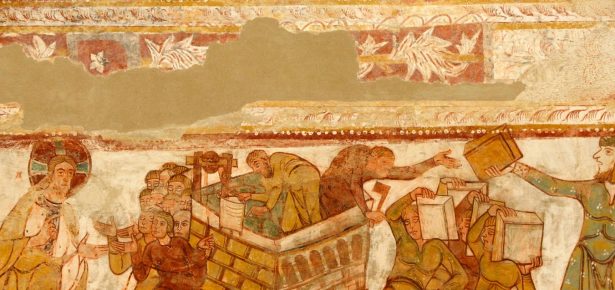
What does it mean and what does it take to be a foreign language speaker in late antique Christianity? Was such a person considered a heretic? A barbarian? A Christian of equal standing? A saint or a demon?
To frame this problem in more tangible terms, let’s imagine a respectable Greek-speaking churchgoer in fourth-century Constantinople. He may have been aware that there were some strange and presumably “barbarian” people in remote regions of the empire and beyond, who spoke their “bizarre” languages and who nevertheless regarded themselves as Christians. Did our Constantinopolitan fellow consider them to be Christians of equal status who just happened to speak a weird language? Or did he take the fact that these people spoke and prayed to God in a different tongue to affect their standing as Christians?
My book The Slow Fall of Babel: Languages and Identities in Late Antique Christianity explores early Christian ideas about foreign languages, linguistic history, and linguistic diversity and investigates how language differences and language-related socio-cultural stereotypes were drawn into the process of constructing and negotiating distinctly Christian and specific confessional identities in the late antique Mediterranean.
The slow fall of Babel is the story about the transformation of the ways in which the increasingly Christianized elites of the late antique Mediterranean experienced and conceptualized linguistic differences. The metaphor of Babel stands for the magnificent edifice of classical culture that was about to reach the sky, but remained self-sufficient and self-contained in its virtual monolingualism – the paradigm within which even Latin was sometimes considered just a dialect of Greek. The gradual erosion of this vision is the slow fall of Babel that took place in the hearts and minds of a good number of early Christian writers and intellectuals who represented various languages and literary traditions. This step-by-step process included discovering and internalizing the fact that there were multiple other languages in the world as well as subsequent attempts to meaningfully incorporate their speakers into the holistic and distinctly Christian picture of the universe.
In Late Antiquity, confessional and linguistic identities overlapped in ways that produced an astonishing variety of dynamic combinations, hybrid loyalties, and local peculiarities. While links between languages and religious affiliations in the time of Trinitarian and Christological controversies were not fixed or absolute – as with any socially constructed links between various identity attributes – this did not preclude one from being able to tendentiously postulate the existence of such links and emphasize their significance. As is the case with almost any kind of anti-something rhetoric, it is meant to be implemented selectively. Once the anti-heretic rhetoric that speculated on the importance of actual or perceived speech differences took off in Christian discourse, it was always available, though it was not always used. Both orthodox and heterodox parties contributed to building up associative links between certain languages, ethnic groups, and religious movements: Punic and Donatists, Goths or Vandals and Arians, Syriac and followers of non-Chalcedonian theologies. Writers mentioned language differences, accents, and dialects when they served the polemical purposes of their narratives. Orthodox Greek and Latin intellectuals represented by far the most prestigious cultural and literary traditions in the Mediterranean. Their remarks on linguistic peculiarities in the speech of their doctrinal opponents were used in order to create an alienating effect on the rhetorical plane. They did not faithfully describe social practices, and they did not mean to.
At the end, answering the question “What does it mean and what does it take to be a foreign language speaker in late antique Christianity?” I cannot but agree with the words by which Robin Whelan finishes the last chapter of his book: “Being Christian [in Vandal Africa] was not a problem unless it was made into one.” In the very same vein, I would say that being a foreign language speaker in late antique Christianity was not a problem for the most part, unless one wanted to intentionally bring forward the issue of language differences to reinforce points of theological polemic. After all, the noble end of debunking a heretic would probably justify the somewhat dubious means of speculating about languages and ad hominem remarks on one’s accent.
Latest Comments
Have your say!